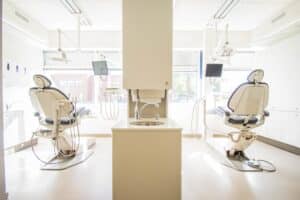In preparation of your dental implant procedure, your dental surgeon has probably gone over various details of the aftercare steps you will have to take to maintain your implant’s health over time. That’s right, your dental implants, though artificially made, still require regular hygienic care like your natural teeth. Certain dietary adjustments and regular cleaning routines will have to be followed according to your dentist’s instructions.
Just like your original teeth, dental implants can be damaged over time if neglected or not properly taken care of. Although they are considered a “permanent” tooth replacement option, their lifespan heavily depends on how you (the patient) cares for them. Read below to find out more information on what cleaning and eating habits you’ll need to follow to properly care for your dental implants.

As mentioned earlier in this article, dental implants act very similarly to your natural teeth and despite not being able to decay, they can suffer damages if not cleaned regularly. So what does a typical hygiene routine look like when caring for implants? Well, according to The Silberg Center for Dental Science, the routine is basically the same as your normal routine. See more below.
HOW DO I TAKE CARE OF MY DENTAL IMPLANTS?
“The daily care of dental implants is very similar to the care of natural teeth. Restored dental implants should be kept clean and plaque free twice a day using a brush and floss. Cleaning is especially important after meals. This is accomplished by gently brushing, giving special attention to all sides of the implant.
Oral hygiene aids may include:
Small, soft, manual toothbrush or an electric brush
Low-abrasive, tartar-control toothpaste
Dental floss for cleaning around the abutments
Other supplies that may be recommended by the doctor can include:Antimicrobial mouth rinses
Inter-dental brushes or other aids for removing plaque between the teeth on either side of the implant(s)
Disclosing tablets to stain the locations of plaque accumulation”
You may not think that eating habits impact your dental implants health but think again. Certain foods that you eat can still dramatically alter the quality of health in the surrounding areas of your implant such as the gums. In the first few weeks after your surgery, it will also be necessary to go on a “soft food diet” to prevent pain and infection from occurring. See here what the Texas Oral Surgery Specialists have to say about eating habits after dental implant surgery:
Are there food restrictions with tooth implants?
“Although you will eventually be able to enjoy a complete diet, you should check with your oral surgeon for specific instructions on foods that you may need to eliminate as you heal from the tooth implant placement procedure. For example, patients typically need to maintain a softer diet (including foods like eggs, applesauce, mashed potatoes, ice cream) in the first couple of weeks after the dental implants are placed, as chewing crunchy or sticky items could interfere with that initial healing process. Ask your surgeon if you have any questions about when you can resume a normal diet.
Additionally, you should use common sense when chewing with your dental implants. You don’t have carte blanche to gnaw on whatever you want. Anything that could damage your biological teeth (ice cubes, non-food items like pencils and fingernails, using your teeth to open packages, etc.) can harm your dental implants, too.”
Now that it’s clear how important it is to take care of your implants by cleaning them daily and practicing safe eating habits, let’s examine how long the lifespan of a dental implant can actually reach. AZ Family Dental talks this topic in the following article and what influences the life expectancy of a dental implant.
Ask Dr. Parker: Are Dental Implants Permanent?
“How well you take care of your dental implants, like daily flossing and brushing, seeing a dentist every six months.
Avoiding chewing or biting down on extremely hard items, like pen tips or pencils, and not opening things with your teeth.
How skillful your dentist is at placing your dental implant. Experts know how to evaluate the progress of osseointegration and whether your jawbone has completely absorbed the implant.
Your lifestyle and overall health.”
If you’re interested in learning more about dental implant care, reach out to the dental health experts at All In One Dental Innovations by calling us at (925)-828-9811 today!
Cleaning and Eating with Your Dental Implants is available on: http://www.allin1dental.com/
All In One Dental Innovations
7046 Dublin Blvd
Dublin, CA 94568
(925) 828-9811
info@allin1dental.com
Google+
Google Map
Directions to our office
Yelp Page
No comments:
Post a Comment